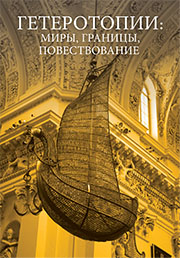Гетеротопия пейзажа: картографический импульс в творчестве Гоголя
Heterotopia of landscape: The Mapping Impulse in the work of Nikolai Gogol
Author(s): Inga VidugiriteSubject(s): Human Geography, Maps / Cartography, Russian Literature, 19th Century, Theory of Literature
Published by: Vilniaus Universiteto Leidykla
Summary/Abstract: In the article, landscape is considered as the interdisciplinary notion, which could be applied to the nature as well as to the art and science. Landscape as a genre is a heterotopia in a sense that Foucault gives to the heterotopia of a garden in the article “Of other spaces: utopias and heterotopias”. As a heterotopia, the landscape has different relationships with the rest of the world: it reflects nature, is a part of it, but, on the other hand, is a result of cultural activity of a man. This paper analyses the connections between a geographic landscape, which was conceptualized in the work of Alexander Humboldt and Carl Ritter, and the literary landscape that was created by Nikolai Gogol in the story “The terrible vengeance”. The paper shows how in this story Gogol used the relief map of Ritter to create the landscape of the Carpathian Mountains, as well as the General map of Ukraine by the engineer Guillaume Le Vasseur de Beauplan to define the geographical area of the storyline. Using of the geographical maps as sources for the narration of the story suggests that Gogol, following Herder and Western European historians, aimed to create a landscape of Ukraine, which would explain the history and the spirit of the Ukrainian nation. The relationship between the relief map of the Europe and the map of Ukraine, which are used as sources for the space of “The terrible vengeance”, enables to state that Gogol conceived Ukraine as a (heterotopic) part of one big unit – the whole landscape of Europe.
Journal: Literatūra
- Issue Year: 57/2015
- Issue No: 5
- Page Range: 111-125
- Page Count: 15
- Language: Russian

